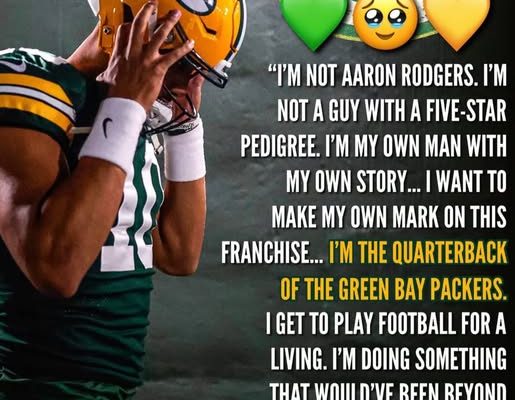There’s a moment every franchise quarterback lives for—the one where doubt gives way to destiny, where comparisons fade into silence, and the voice that echoes the loudest is his own. For Jordan Love, that moment came not with a touchdown pass or a playoff win, but with a simple, declarative sentence: “I’m the quarterback of the Green Bay Packers.” Just seven words, but they carried the weight of history, expectation, loss, and something even deeper—ownership. Not of a title, but of a journey that no longer runs in parallel to legends, but on its own terms.
When Jordan Love walked into Lambeau Field, he wasn’t just walking into one of the most storied franchises in NFL history—he was stepping into a shadow cast by two generational greats. Brett Favre, the ironman gunslinger who gave Green Bay its first Super Bowl in nearly 30 years. Aaron Rodgers, the surgeon-like tactician who followed Favre and carved his name into the elite with pinpoint accuracy, MVPs, and a ring of his own. Most quarterbacks would be honored—and perhaps intimidated—to carry that baton. But for Love, it was never about inheritance. It was always about intention.
There’s something hauntingly beautiful about a man trying to write his own story while the ink of others still dries around him. Jordan Love knows the ghosts. He’s heard the chants. He’s seen the smirks of doubters and the unrelenting loyalty of Rodgers’ fans. But he never tried to mimic the past. He’s never donned the mannerisms of Favre or the cadence of Rodgers. He’s not a clone. He’s not a placeholder. He’s a young man with a dream, a playbook, and the heart to chase something authentic.
It would have been easy for Love to fold under the pressure. Drafted in 2020 amid a storm of controversy, he entered the league as the heir apparent no one asked for—at least not out loud. The fan base was split. The media questioned the pick. Rodgers responded with two of the best seasons of his career, almost as if to remind everyone the throne was not yet vacant. Love sat, waited, learned, and stayed silent. There were no complaints, no outbursts, no cryptic social media posts. Just work. Patience is hard when the world questions your very existence on a roster, but Love embodied it.
That patience was forged in a much deeper fire than football. Long before Lambeau, Jordan Love faced adversity no young man should endure. His father, Orbin Love, a police officer and father of four, took his own life when Jordan was just 14 years old. The wound never fully closes when you lose a parent in such a way. It becomes a scar you carry every day—visible only to you, but felt in every breath. Jordan has said before that he plays for his father, that the dream they once shared is now his responsibility alone. Every snap is a tribute. Every touchdown a whisper of “we made it.” And when he says he’s the quarterback of the Green Bay Packers, it’s not just a statement—it’s a fulfilled promise.
That emotional bedrock is why his rise feels different. It’s why fans across the league, not just in Wisconsin, find themselves pulling for him. He isn’t the loudest. He isn’t the flashiest. But he’s real. And in a league where so much is packaged and polished, Jordan Love brings something rare: vulnerability wrapped in grit. He doesn’t pretend to have all the answers. He just works until he finds them.
And work he has. The transition from a bench role to a starting quarterback in the NFL is not a gentle climb—it’s a leap. But Love approached it with the kind of preparation that makes coaches sleep better at night. His footwork improved. His decision-making sharpened. His leadership voice, once quiet, grew louder in the huddle. He didn’t ask his teammates to believe in him. He gave them reasons to. That’s leadership, and it’s earned, not inherited.
It wasn’t always smooth. Early starts came with growing pains. Missed reads. Poor timing. Interceptions that looked like he was still figuring out the speed of the league. But there were flashes—moments when the ball left his hand and you saw the potential that had Packers brass grinning back in 2020. And as the games went on, those flashes became stretches. Those stretches turned into wins. And those wins became confidence—not just his own, but his team’s.
One of the most telling signs of a quarterback’s emergence isn’t what happens on the field—it’s how his teammates talk about him. Quiet support becomes vocal advocacy. Vets lean in instead of offering side-eyes. Coaches praise more than they hedge. In Green Bay, you’re starting to see that shift. You’re hearing players talk about Love’s poise, his command, his growth. You’re seeing receivers run routes harder, linemen block a half-second longer. That’s buy-in. That’s belief. And it’s contagious.
Of course, this isn’t a Disney movie. Jordan Love will still face doubts. One season doesn’t etch a name in stone, especially not in Titletown, where quarterbacks are measured by Lombardi Trophies, not passer ratings. The standard in Green Bay is high—unforgivingly so. But Love doesn’t flinch. He doesn’t chase Rodgers’ legacy because he understands the trap of comparison. The greats aren’t built in someone else’s image. They’re carved out of authenticity. Favre was Favre. Rodgers was Rodgers. And Jordan Love? He’s becoming something else entirely. Someone who can inspire in a different way.
His play has a calm urgency to it. He doesn’t panic under pressure. He maneuvers in the pocket like someone who knows he’s not bulletproof but trusts his armor. His eyes downfield, always scanning, tell you he believes there’s always a play to be made. And when he finds it, there’s a joy—not of arrogance, but of purpose. You get the sense he still marvels at the moment. That after all he’s endured, every touchdown still feels like a miracle earned.
And maybe that’s the best part of all this. Jordan Love is grateful. Not just to be a starter. Not just to wear the green and gold. But to have the opportunity to honor a legacy not of Rodgers or Favre, but of his father, his family, his resilience. Football is a brutal business, and quarterbacks often become caricatures—celebrated, criticized, dissected daily. But Jordan Love reminds us that behind every helmet is a human being. One with pain, dreams, flaws, and fight.
He doesn’t ask for sympathy. He doesn’t posture for glory. He just plays—for his team, for himself, and for a father watching from somewhere beyond the lights. And that’s what makes his story so easy to root for. Not because it’s perfect, but because it’s real. Because he’s not trying to be anyone else. Because every step he takes is his own.
So when Jordan Love stands tall, looks into the camera or the eyes of his team, and says, “I’m the quarterback of the Green Bay Packers,” it hits different. Not because of the history it carries, but because of the future it hints at. A future authored not in someone else’s handwriting, but in the bold, deliberate strokes of a young man unafraid to be exactly who he is.
And in a sport that so often chews up identity and spits out product, that kind of self-possession is rare. Jordan Love isn’t trying to outrun ghosts. He’s not auditioning for acceptance. He’s already home. He’s already arrived. Not at the destination, perhaps, but at the place where the journey is finally his. And if the early chapters are any indication, the rest of the league better start paying attention.
Because Jordan Love isn’t following a legend. He’s becoming one.



